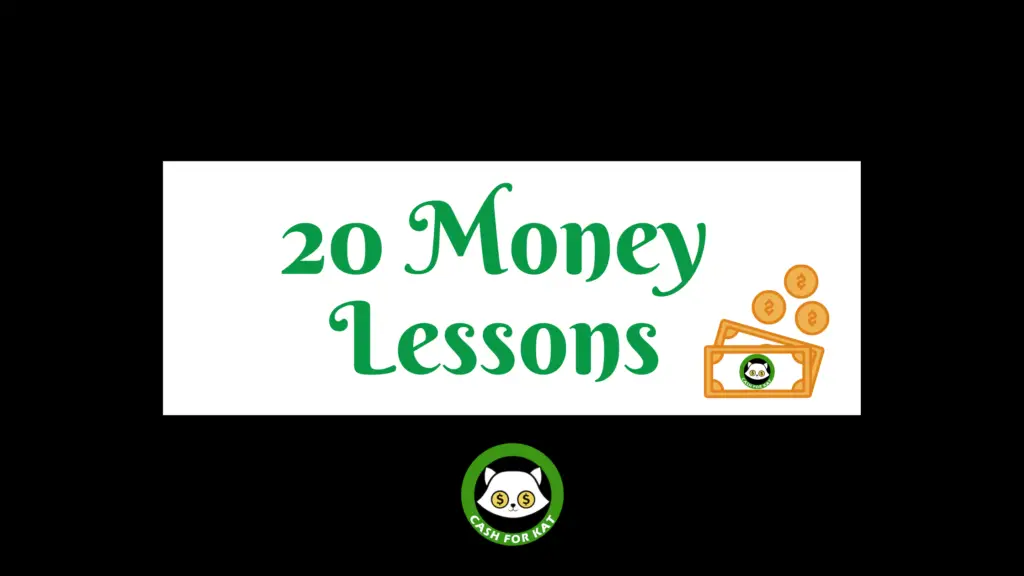
Money lessons can be found anywhere, especially during last year.
Let’s be real, everyone walked away from 2020 with some sort of money lesson or personal finance revelation. This was a hard year for the globe and one that will change most people’s relationship with money for the rest of their lives.
I have had several such revelations over the course of 2020. It only made sense to share them with you here! Without further ado, here are my 20 Money Lessons from 2020!
Tried and True Money Lessons
1. Cultivating Skill Sets is Key
Having more than one stream of income is a way of ensuring that you will still have an income in case one revenue stream dries up. This year really spelled out how dangerous it is to rely on one income. Your money could dry up unexpectedly due to layoffs, closures, and other disasters beyond human control.
If you get really good at a skill, it is easy to use that to create a stream of income outside of your 9 to 5. The better you get at that skill, the better your chances of getting hired regardless of what is happening in the economy.
2. Diverse Streams of Income Beats Multiple Streams
When COVID hit, I had multiple streams of income… but they were all teaching based. I had in-person teaching gigs and was able to transition to online teaching as well, but the industry became saturated as other teachers across the globe turned to these platforms.
Luckily, I am always working on different projects. I was able to easily leverage my sales experience into starting my sales consulting business… Not everyone has been so lucky.
This is why it is so important to build a diverse skill set that allows you to have incomes from different industries. You can’t prepare for everything, but doing this reduces your risk!
3. Keep Enough of Your Assets Liquid
I understand the desire to invest as much as possible, but when you do that your money is harder to access and fluctuates with the stock market.
I like to keep a good-sized emergency fund in my checking/savings account, an additional buffer in my brokerage account. I also keep a few credit cards with low balances on standby.
For me, knowing that I have at least the next 3 months expenses figured out if I suddenly stop receiving my pay for any reason buys me the time I need to make more long term financial decisions without panic or fear.
4. Don’t Count Money Until it Is Already in Hand
I had a regular part-time English teaching gig throughout 2020. Right when the pandemic started, they were over 3 days late with my pay.
I was worried I wouldn’t see the money at all! Many of the other teachers were angry and it was one of the first times I’ve ever had to think about handling difficult workplace dynamics. Thankfully, I always make sure to have enough money ready to have my immediate expenses covered in the event that something like this would happen. The other teachers unfortunately did not and it was not a pretty few days at work.
Of course, I still expect to be paid for work that I’ve performed…. I just like to make sure that I’ve got myself covered long before I expect a paycheck to show up.
5. Cooking Is The Best Way To Control Expenses
Since we are on the topic of food, it turns out that even in Cambodia cooking food at home can be a real financial game changer. Since most of your big, recurrent expenses are fixed costs (like housing), getting creative in the kitchen is one of the easiest ways to scale back your monthly budget.
At one point, I was able to scale back our budget to the point where it only cost around $200 a month to feed two people! Of course, buying in bulk at Makro (Cambodia’s Costco) really helped us cut back to this level.
6. Your Home Is One Of The Best Investments (For Both Your Physical and Mental Health)
When in college I paid for a really crappy small apartment because I was just happy to have a safe, stable, and affordable place to call my own.
After having a variety of roomies and moving almost every semester, I realized that stability is the key to happiness, and peace of mind is always worth the money.
This gave me the ability to think more strategically about my life because I was no longer worried about where I would live or if I could afford rent during the summers while I was in college.
Now, I splurge a little on housing because I can afford to and my home is where I spend most of my time. If I like it, then I spend less money going out anyway! If an extra $100 on an apartment makes me enjoy my life even 5% more every day, then that is money well spent.
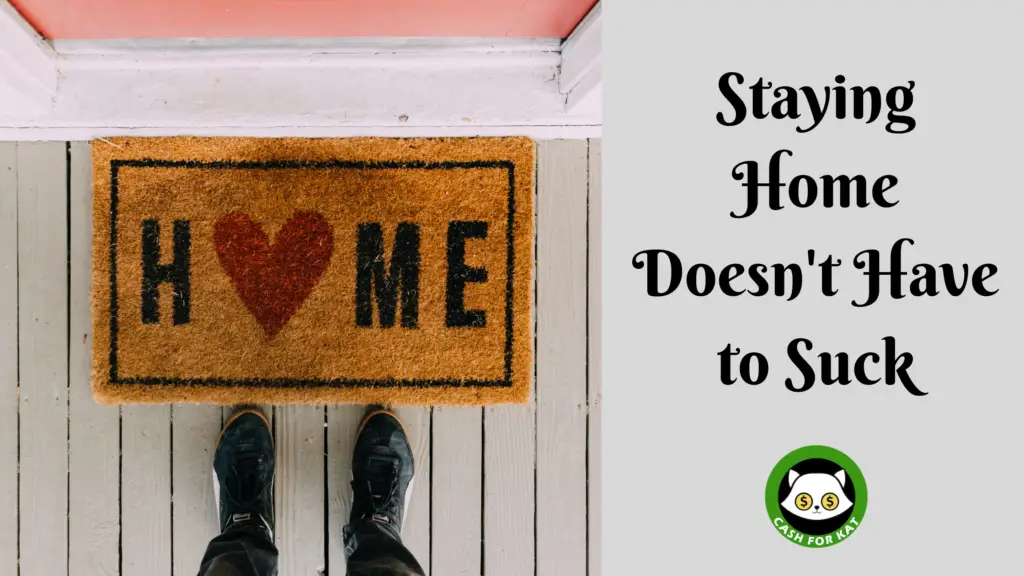
Pandemic Money Lessons
7. You Can’t Prepare For Everything
Is anyone surprised that this came up early on the list? We knew this one before, but a pandemic really sheds light on how true this statement is. Many people in the Financial Independence community were not as prepared as they expected when faced with something like a pandemic.
Some sold when the market was down, anticipating it to fall even further only to watch it climb to new highs. Others realized that their emergency fund wasn’t as big as it should have been or found themselves unexpectedly taking care of family and friends.
The one constant in life is change and 2020 has further taught us that money is just a tool that can help us weather the storm… but not avoid it.
8. Have an Emergency Fund, but Know It Might Never Be Enough
Admittedly, I let my emergency fund run down quite a bit due to my travels in 2019. When COVID hit, I was actually reducing my work hours so that I could spend more time on building online income streams.
My initial emergency fund was wiped out in about 3 months as I was also supporting my boyfriend, who had just moved in with me from another country. Times were rough, but we made it work and are now doing better than ever.
I’ve spent the last few months rebuilding my emergency fund. I often find myself wondering, “How much would make me feel secure during a global pandemic”. Turns out, there is no number that would make me feel 100% secure. That being said, I’ve decided to work towards a 6-month fund over the course of 2021.
9. You Can Make Money From Anywhere… Even In A Pandemic
To put it frankly, Rucker Sales Consulting is a product of the pandemic. I had done some small sales consulting work before but was enjoying the ease of teaching a few English classes every week to cover the bills while working on my blog.
I’ve always known that sales is a highly desirable skill set and knew that if anything were to happen while abroad I could lean on my industry knowledge to keep myself employed. Of course, I had no idea that this would result in me plunging into my consulting business full-time during a pandemic!
10. Staying Home Doesn’t Have to Suck
As an extrovert, I thought I would struggle much more with spending time at home as I transitioned to remote work.
I still don’t love staying at home but it has allowed me to create a routine that has increased my productivity. I also get to work on hobbies I would otherwise ignore (ie. cooking)! There are so many frugal hobbies that you can do and some will even help you make a side income!
11. There Are Always Areas of Your Budget You Can Cut
I typically live a pretty frugal lifestyle and wouldn’t have thought I could cut much out of my budget even during a pandemic. I was wrong. When my boyfriend first moved in, neither of us had jobs and I spent 100% of my time thinking about our budget.
We bought groceries in bulk, made sure no food went to waste, and barely left our house during March. During an average month in Cambodia, I spend around $1,200 a month on housing, transportation, food, activities, etc.
When the pandemic hit, I scaled our monthly budget down to $800 for two people. We barely left the house, but other than that we were still eating very well and were able to entertain ourselves with books/Netflix.
12. The Market Can, And Will, Cut Your Investments in Half
Of course, everyone tells you to be prepared for a 20% or more dip in your investments as the market fluctuates. In theory, you feel prepared for this but of course, it is another matter entirely to experience it first hand!
At one point, I saw my $20k portfolio drop all the way down to $12k. That is several thousand less than what I’d initially put in! March really did a number on my investments, but I focused on other things instead of panicking and watched my investments bounce back.
Money Lessons from Society
13. Income Inequality Still Exists At Drastic Levels
As if I needed a reason to hate 2020 even more. George Floyd’s murder in June, Trump telling white supremacists to “stand down and stand by”, ongoing systemic racism, all made for a rather awful year.
In comparison, Income Inequality is really just the tip of the iceberg. I am glad 2020 is over.
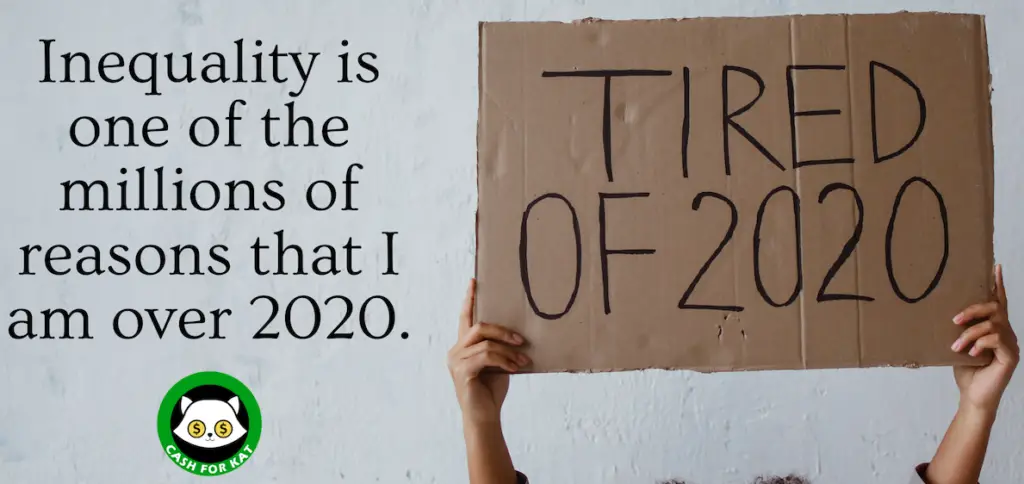
Money Lessons From McKinsey & Co., COVID-19 and the great reset: Briefing note #35, December 9, 2020
“More than 46,000 Black Americans have died from COVID-19—twice as many, proportionally, as white Americans. This year also saw the murders of George Floyd, Breonna Taylor, and many other Black Americans.
The events of this year are emblematic of long-standing inequities and are rooted in a long history of systemic discrimination. The typical Black American family has eight times less wealth than a white American family.
The racial wealth gap has profound consequences, for families and the US economy, which misses out on between $1 trillion and $1.5 trillion in GDP output each year.”
Money Lessons From the US Bureau of Labor Statistics’ Usual Weekly Earnings of Wage and Salary Workers News Release (October 2020)
Among the major race and ethnicity groups, median weekly earnings of Blacks ($813) and Hispanics ($785) working full-time jobs were lower than those of Whites ($1,008) and Asians ($1,392).
By sex, median weekly earnings for Black men were $869, or 77.5 percent of the median for White men ($1,122). Median earnings for Hispanic men were $823, or 73.4 percent of the median for White men.
The difference was less among women, as Black women’s median earnings were $768, or 84.4 percent of those for White women ($910), and earnings for Hispanic women were $722, or 79.3 percent of those for White women. Earnings of Asian men ($1,542) and women ($1,224) were higher than those of their White counterparts.
14. Some Industries May Be Recession-Proof … But Not Pandemic Proof!
I remember my dad saying something to me along the lines of certain industries doing well even in a recession. One of the industries listed was bars because people often flock to them in both times of joy and sorrow.
It turns out people don’t flock to them during global pandemics. Who knew?
Likewise, many other industries have suffered during the pandemic in ways they wouldn’t during a recession. According to S&P Global, some of the most COVID impacted industries are Airlines, Casino & Gaming, and Leisure Facilities.
15. No Matter How Successful An Industry Is, It Can Be Disrupted.
Every once in a while a piece of technology or a concept will come around that changes the way an industry functions.
When Ford introduced the assembly line, manufacturing as we knew it changed for the better. When Uber and Lyft came around, the transportation industry transformed to include the convenience of smartphones.
Usually, we think of these disruptions as a positive advancement where smaller companies with fewer resources are able to challenge established businesses. During COVID, many traditional business models fell apart but we had very little infrastructure in place to fill in the gaps.
While innovation has taken place over the last few months, it is clear by how long it took for our lives to take on a “new normal” that our world is still trying to figure out how to function. It turns out, innovation isn’t the only thing that can disrupt an industry.
16. The Biggest Money Lesson of All: Don’t Count on a Timely Response From the Government
I never expected to have an event happen during my lifetime that would require a massive government response that involved financing the cost of living of millions of people. Very few people ever anticipated anything that we’ve experienced in 2020!
As an American abroad during this pandemic, it was good to gain a lot of clarity on what I could realistically expect support wise from the government and embassy.
Knowing that I would be somewhat left to my own devices during a global crisis actually solidified my confidence in living abroad. My money went a lot further in Cambodia than it would have gone in the US!
Money Lessons from Cambodia and Beyond
17. Know that People Across the Globe Care
Through my sales consulting business and work in Cambodia, I have noticed that this pandemic has resulted in more Non-Profit Organizations starting.
It is amazing to see thousands of people grouping together for the common good. Instead of giving up during a pandemic, many of these NPOs developed in response to a particular need in the community.
Communities have also increased their fundraising efforts and it has been truly heartwarming to see people giving their time and money to worthy causes.
18. Don’t Forget to Give Back
In a country like Cambodia, you can really see how your spending habits can impact the community around you. In particular, the hospitality industry has been struggling across the country.
Instead of staying at big hotel chains or shopping at brand name stores, simple spending changes can have a ripple effect across the community that you live in.
19. Don’t Take Your City’s Infrastructure for Granted
Living in Cambodia during a pandemic was a strange experience because the food supply chain is not as reliable or established here. Back in March, there was talk on the streets that we would stop receiving food imports from neighboring countries.
During the hot season, many people in the provinces struggle to get water and in the rainy season, floods can cause massive homelessness and electrical failures across the country.
In a way, the pandemic became just one of many life-threatening struggles that occur here on a daily basis. As an expat, we are often shielded from the harsh reality of day-to-day life for locals, but living through a pandemic has brought a sense of community as we all lean on each other to survive.
20. Have Empathy For the Situation of Others
This is less of a money lesson and more of a fact. You never know how people are impacted financially, emotionally, or even physically by their environment.
One of my favorite Youtubers is Molly Burke. She primarily shares lifestyle and fashion tips, but she is also a member of the blind community. I am not visually impaired myself, so I can only share some of what I learned about Molly’s experience from her youtube channel.
Molly typically navigates the world via her guide dog. Due to limited training locations and how long it can take to train a guide dog, there is often a long waiting list that lasts for about a year.
Most of these centers have also had to close because somehow they aren’t considered essential businesses. This delays training and integrating the dogs into the lives of their new owners.
Unfortunately, due to COVID changing the lifestyles of sight dog users like Molly, many of these dogs who were nearing retirement age are now out of practice doing their work of guiding their humans.
This can be very dangerous since these dogs are trained to protect their humans from things like street traffic or above the head obstacles (like trees).
As a result, many dogs have had to retire early due to the lack of work. At the same time, there are fewer dogs who are finishing training and being matched with owners. This can impact a blind person’s ability to work and be self-sufficient.
The unfortunate truth is that many disadvantaged communities will be impacted by COVID for years to come and in ways that we might not yet know or understand.
Money Lessons for the New Year
I really want to finish this post on a positive note. The more we understand the world around us, the more that we can do to create lasting change.
Your money can do more than just keep you stable or buy you financial freedom. We can use our money to create lasting change in the world around us.
Creating generational wealth, funding opportunity scholarships, and giving back to disadvantaged communities are just a few ways to get involved.
What did you think of this list? Did you learn any of these money lessons yourself or do you have money lessons to add to this list? Leave me a note in the comments, I’d love to hear from you!
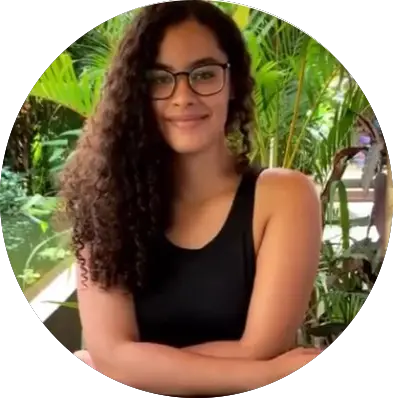
Kathryn Rucker is a sales consultant and content writer. With 7+ years of sales experience, she is passionate about helping businesses and individuals grow their sales pipelines by improving their online presence.
She has been traveling full-time since 2018 thanks to the location and financial independence she has gained from her business, Kat Rucker Consulting Group. You can connect with her on LinkedIn.
Kathryn Rucker is a sales consultant and content writer. With 7+ years of sales experience, she is passionate about helping businesses and individuals grow their sales pipelines by improving their online presence.
She has been traveling full-time since 2018 thanks to the location and financial independence she has gained from her business, Kat Rucker Consulting Group. You can connect with her on LinkedIn.
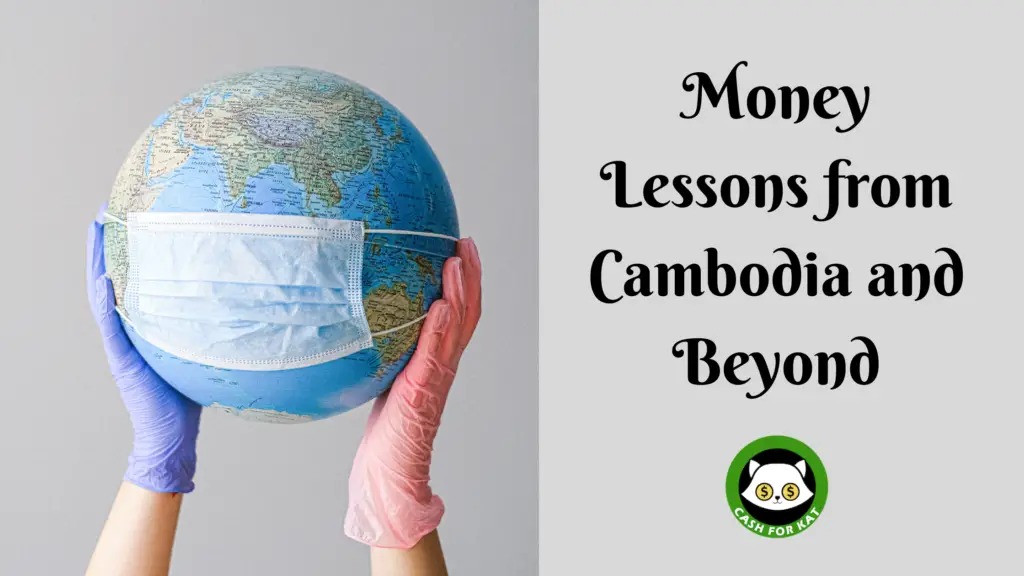
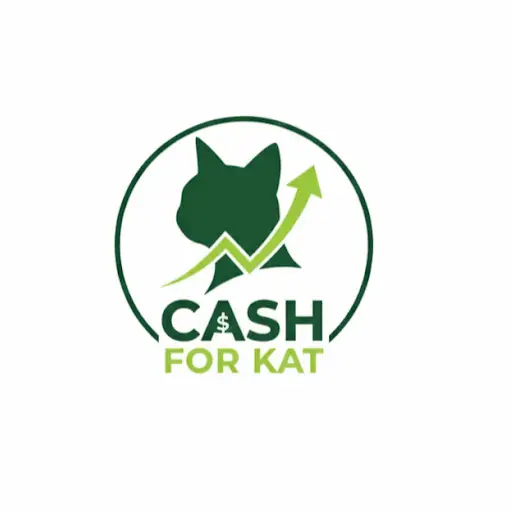
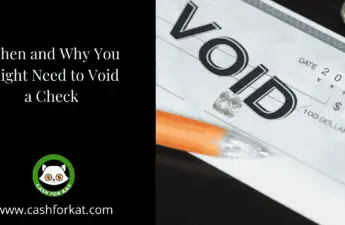

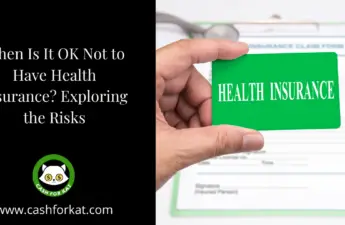
Totally agree with all these points above ! 🙌 So true ! I try to do this & apply it since a couple of years! Keep up the good work Kat !!